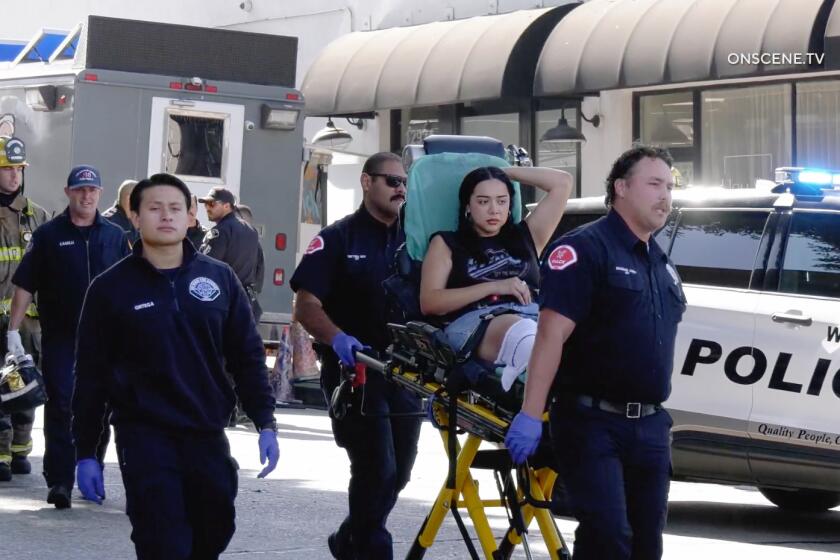Brewers Barreling Toward Price War : Marketing: With beer industry sales going flat, Anheuser-Busch goes after a bigger market share by cutting prices.
Beer drinkers have reason to rejoice: A price war is brewing between the nation’s beer makers.
But anti-alcohol forces can rejoice some, too: The price-cutting is further evidence that Americans are drinking in moderation.
A big shot was fired in the beer war Wednesday when Anheuser-Busch made a surprise announcement that it would “reluctantly” begin discounting its brands, which include the premium Michelob and best-selling Budweiser. A statement like that is important because it comes from the world’s largest brewer. In the United States, the St. Louis giant commands 42% of the $50-billion beer market.
“There has been a beer war in this country for the past 18 months, but we’ve really tried to stay above the fray,” said Jerry Ritter, Anheuser-Busch’s chief financial officer, in the wake of the company’s disappointing third-quarter earnings report. “Now, we are joining the fray.”
Despite its huge share of the beer market, Anheuser-Busch has suffered like other brewers from beer consumption that has been as flat as stale ale for most of the 1980s. So the only way to build future earnings, the company said, is to increase its share of the market.
A spokesman for Miller Brewing, a Philip Morris unit based in Milwaukee, denied that the company had cut prices but said Miller did enjoy record sales in August.
The Anheuser-Busch announcement surprised many industry observers.
“That’s a very dramatic development,” said Paul Gillette, publisher of Beverage Hotline in Los Angeles. “It was quite unexpected.” Julie Neimann, a securities analyst for Stifel Nicolaus in St. Louis, predicted “flat-out war.”
Still, beer drinkers will likely find only modest reductions, perhaps 5%, or about 20 cents a six-pack, predicted Jerry Steinman, publisher of Beer Market’s Insight. “It’ll mean some slight savings for consumers, but they’ll never bring it down a tremendous amount.”
Six-packs of Budweiser, Miller Genuine Draft and Coors generally cost about $3.50, although the companies frequently knock the price below $3 in selected markets.
The price cutting is likely to rile the nation’s “neo-prohibitionists,” said Max Kerstein, editor of Beverage Bulletin in Beverly Hills.
Patricia Taylor, who directs the alcohol project for the Washington-based Center for Science in the Public Interest, said she would be concerned if the reductions spark a sharp increase in beer consumption and alcohol-related health and safety problems. But, she added, the longer-term significance may be that moderation is spreading among U.S. consumers.
“The beer companies are reacting to larger forces in our society that are speaking out against alcohol and alcohol-related problems,” Taylor said.
The Center for Science in the Public Interest played a key role in prodding Congress to enact legislation last year requiring that health warnings be placed on alcoholic beverages and posted where they are sold.
The price-cutting announcement by Anheuser-Busch came as the company reported that third-quarter profit increased a modest 5.2% to $238.3 million while sales rose 6.1% to $2.7 billion.
A number of analysts reacted by lowering their earnings predictions for Anheuser-Busch. And investors responded by making Anheuser-Busch the second most actively traded stock Wednesday on the New York Stock Exchange, where its price dropped $4.375 to $38.50 a share. It shed another 50 cents on Thursday and was the most actively traded stock, with nearly 4.3 million shares changing hands. It was followed by Philip Morris, owner of Miller Brewing, with 3.66 million shares traded. Philip Morris closed at $41.625, off $1.875.
Anheuser-Busch President August A. Busch III said the brewer was “very reluctant” to discount beer prices but added: “We cannot permit a further slowing in our volume trend.” Busch said discounted prices will further slow earnings growth next year but predicted that the strategy would increase market share and eventually swell profits.
BEER DRINKING U.S. per capita beer consumption In gallons per person (21 years and older) 1970: 30.7 1988: 34.0 Source: Impact Magazine
More to Read
Inside the business of entertainment
The Wide Shot brings you news, analysis and insights on everything from streaming wars to production — and what it all means for the future.
You may occasionally receive promotional content from the Los Angeles Times.






